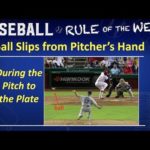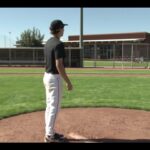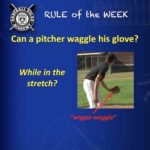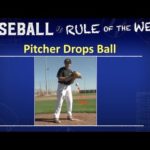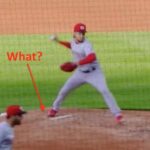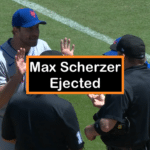6.02 Pitcher Illegal Action
(a) Balks
If there is a runner, or runners, it is a balk when:
(1) The pitcher, while touching his plate, makes any motion naturally associated with his pitch and fails to make such delivery;
Rule 6.02 (a)(1) Comment:
If a left-handed or right-handed pitcher swings his free foot past the back edge of the pitcher’s rubber, he is required to pitch to the batter except to throw to second base on a pick-off play.
(2) The pitcher, while touching his plate, feints a throw to first or third base and fails to complete the throw;
(3) The pitcher, while touching his plate, fails to step directly toward a base before throwing to that base;
Rule 6.02(a)(3) Comment:
Requires the pitcher, while touching his plate, to step directly toward a base before throwing to that base. If a pitcher turns or spins off of his free foot without actually stepping or if he turns his body and throws before stepping, it is a balk. A pitcher is to step directly toward a base before throwing to that base and is required to throw (except to second base) because he steps. It is a balk if, with runners on first and third, the pitcher steps toward third and does not throw, merely to bluff the runner back to third; then seeing the runner on first start for second, turn and step toward and throw to first base. It is legal for a pitcher to feint a throw to second base.
(4) The pitcher, while touching his plate, throws, or feints a throw to an unoccupied base, except for the purpose of making a play;
Rule 6.02 (a)(4) Comment:
When determining whether the pitcher throws or feints a throw to an unoccupied base for the purpose of making a play, the umpire should consider whether a runner on the previous base demonstrates or otherwise creates an impression of his intent to advance to such unoccupied base.
(5) The pitcher makes an illegal pitch;
Rule 6.02(a)(5) Comment:
A quick pitch is an illegal pitch. Umpires will judge a quick pitch as one delivered before the batter is reasonably set in the batter’s box. With runners on base the penalty is a balk; with no runners on base, it is a ball. The quick pitch is dangerous and should not be permitted.
(6) The pitcher delivers the ball to the batter while he is not facing the batter;
(7) The pitcher makes any motion naturally associated with his pitch while he is not touching the pitcher’s plate;
(8) The pitcher unnecessarily delays the game;
Rule 6.02(a)(8) Comment:
Rule 6.02 (a)(8) shall not apply when a warning is given pursuant to Rule 6.02 (c)(8) (which prohibits intentional delay of a game by throwing to fielders not in an attempt to put a runner out). If a pitcher is ejected pursuant to Rule 6.02(c)(8) for continuing to delay the game, the penalty in Rule 6.02 (a)(8) shall also apply. Rule 5.07 (c) (which sets a time limit for a pitcher to deliver the ball when the bases are unoccupied) applies only when there are no runners on base.
(9) The pitcher, without having the ball, stands on or astride the pitcher’s plate or while off the plate, he feints a pitch;
(10) The pitcher, after coming to a legal pitching position, removes one hand from the ball other than in an actual pitch, or in throwing to a base;
(11) The pitcher, while touching his plate, accidentally or intentionally has the ball slip or fall out of his hand or glove;
(12) The pitcher, while giving an intentional base on balls, pitches when the catcher is not in the catcher’s box;
(13) The pitcher delivers the pitch from Set Position without coming to a stop.
PENALTY: The ball is dead, and each runner shall advance one base without liability to be put out, unless the batter reaches first on a hit, an error, a base on balls, a hit batter, or otherwise, and all other runners advance at least one base, in which case the play proceeds without reference to the balk.
APPROVED RULING: In cases where a pitcher balks and throws wild, either to a base or to home plate, a runner or runners may advance beyond the base to which he is entitled at his own risk.
APPROVED RULING: A runner who misses the first base to which he is advancing and who is called out on appeal shall be considered as having advanced one base for the purpose of this rule.
Rule 6.02(a) Comment:
Umpires should bear in mind that the purpose of the balk rule is to prevent the pitcher from deliberately deceiving the base runner. If there is doubt in the umpire’s mind, the “intent” of the pitcher should govern. However, certain specifics should be borne in mind:
(A) Straddling the pitcher’s rubber without the ball is to be interpreted as intent to deceive and ruled a balk.
(B) With a runner on first base the pitcher may make a complete turn, without hesitating toward first, and throw to second. This is not to be interpreted as throwing to an unoccupied base.
(b) Illegal Pitches With Bases Unoccupied
If the pitcher makes an illegal pitch with the bases unoccupied, it shall be called a ball unless the batter reaches first base on a hit, an error, a base on balls, a hit batter or otherwise.
Rule 6.02(b) Comment:
A ball which slips out of a pitcher’s hand and crosses the foul line shall be called a ball; otherwise it will be called no pitch. This would be a balk with men on base.
(c) Pitching Prohibitions
The pitcher shall not:
(1) While in the 18-foot circle surrounding the pitcher’s plate, touch the ball after touching his mouth or lips, or touch his mouth or lips while he is in contact with the pitcher’s plate. The pitcher must clearly wipe the fingers of his pitching hand dry before touching the ball or the pitcher’s plate.
EXCEPTION: Provided it is agreed to by both managers, the umpire prior to the start of a game played in cold weather, may permit the pitcher to blow on his hand.
PENALTY: For violation of this part of this rule the umpires shall immediately remove the ball from play and issue a warning to the pitcher. Any subsequent violation shall be called a ball. However, if the pitch is made and a batter reaches first base on a hit, an error, a hit batsman or otherwise, and no other runner is put out before advancing at least one base, the play shall proceed without reference to the violation. Repeat offenders shall be subject to a fine by the League President.
(2) expectorate on the ball, either hand or his glove;
(3) rub the ball on his glove, person or clothing;
(4) apply a foreign substance of any kind to the ball;
(5) deface the ball in any manner; or
(6) deliver a ball altered in a manner prescribed by Rule 6.02(c)(2) through (5) or what is called the “shine” ball, “spit” ball, “mud” ball or “emery” ball. The pitcher is allowed to rub the ball between his bare hands.
(7) Have on his person, or in his possession, any foreign substance. Rule 6.02 (c)(7) Comment: The pitcher may not attach anything to either hand, any finger or either wrist (e.g., Band-Aid, tape, Super Glue, bracelet, etc.). The umpire shall determine if such attachment is indeed a foreign substance for the purpose of Rule 6.02(c)(7), but in no case may the pitcher be allowed to pitch with such attachment to his hand, finger or wrist.
(8) Intentionally delay the game by throwing the ball to players other than the catcher, when the batter is in position, except in an attempt to retire a runner.
PENALTY: If, after warning by the umpire, such delaying action is repeated, the pitcher shall be removed from the game.
(9) Intentionally Pitch at the Batter.
(1) If, in the umpire’s judgment, such a violation occurs, the umpire may elect either to:
(A) Expel the pitcher, or the manager and the pitcher, from the game, or
(B) may warn the pitcher and the manager of both teams that another such pitch will result in the immediate expulsion of that pitcher (or a replacement) and the manager. If, in the umpire’s judgment, circumstances warrant, both teams may be officially “warned” prior to the game or at any time during the game. (League Presidents may take additional action under authority provided in Rule 8.04.)
Rule 6.02(c)(9) Comment:
Team personnel may not come onto the playing surface to argue or dispute a warning issued under Rule 6.02 (c)(9). If a manager, coach or player leaves the dugout or his position to dispute a warning, he should be warned to stop. If he continues, he is subject to ejection. To pitch at a batter’s head is unsportsmanlike and highly dangerous. It should be—and is—condemned by everybody. Umpires should act without hesitation in enforcement of this rule.
(d) PENALTY: For violation of any part of (c) (2) through (7):
(1) The pitcher shall be ejected immediately from the game and shall be suspended automatically. In National Association Leagues, the automatic suspension shall be for 10 games.
(2) If a play follows the violation called by the umpire, the manager of the team at bat may advise the umpire-in-chief that he elects to accept the play. Such election shall be made immediately at the end of the play. However, if the batter reaches first base on a hit, an error, a base on balls, a hit batsman, or otherwise, and no other runner is put out before advancing at least one base, the play shall proceed without reference to the violation.
(3) Even though the team at bat elects to take the play, the violation shall be recognized and the penalties in subsection 1 will still be in effect.
(4) If the manager of the team at bat does not elect to accept the play, the umpire-in-chief shall call an automatic ball and, if there are any runners on base, a balk.
(5) The umpire shall be sole judge on whether any portion of this rule has been violated.
Rule 6.02(d)(1) through 6.02(d)(5) Comment:
If a pitcher violates either Rule 6.02 (c)(2) or Rule 6.02 (c)(3) and, in the judgment of the umpire, the pitcher did not intend, by his act, to alter the characteristics of a pitched ball, then the umpire may, in his discretion, warn the pitcher in lieu of applying the penalty set forth for violations of Rules 6.02 (c)(2) through 6.02(c)(6). If the pitcher persists in violating either of those Rules, however, the umpire should then apply the penalty.
Rule 6.02(d) Comment:
If at any time the ball hits the rosin bag it is in play. In the case of rain or wet field, the umpire may instruct the pitcher to carry the rosin bag in his hip pocket. A pitcher may use the rosin bag for the purpose of applying rosin to his bare hand or hands. Neither the pitcher nor any other player shall dust the ball with the rosin bag; neither shall the pitcher nor any other player be permitted to apply rosin from the bag to his glove or dust any part of his uniform with the rosin bag.

